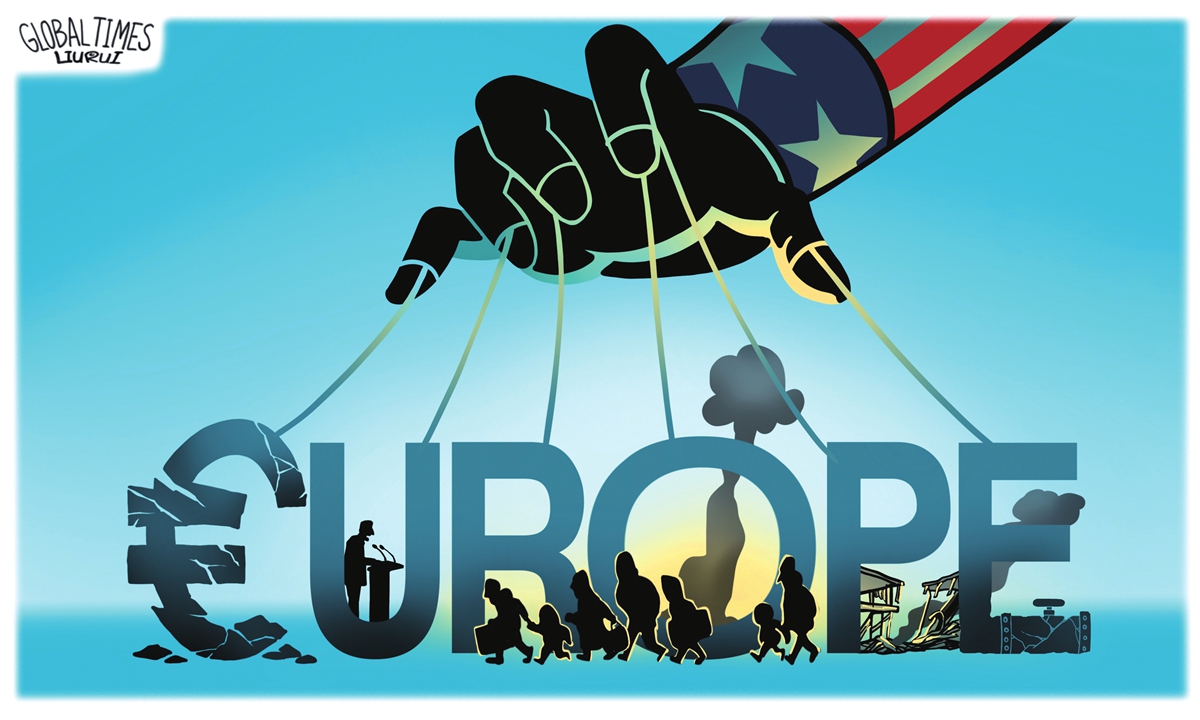OPINION / VOICES
Trump’s NATO jibe should awaken Europe about its fate

US' game of manipulation Illustration: Liu Rui/GT
When Donald Trump, the likely Republican nominee in November's presidential election, said on Saturday that he would not defend any NATO member that had failed to meet a longstanding target of spending 2 percent of its GDP on defense and would even encourage Russia to continue attacking, it has sent "very real shudders through Europe," to use a headline of a CNN article.
Indeed, the whole of Europe was outraged and concerned. NATO chief Jens Stoltenberg hit back, saying that "Any suggestion that allies will not defend each other undermines all of our security, including that of the US, and puts American and European soldiers at increased risk." A number of European leaders also responded, calling for "greater unity and military cooperation across the continent."
Yet the flurry of criticism didn't change Trump's mind. On Tuesday, he defended his record on NATO, saying he had made it "strong."
Trump's stance toward NATO has been known to all. During his tenure in the Oval Office, he was vocal about the US' European allies being free riders who took advantage of the US' strength without paying the due bills. Now as he runs for possible reelection, his opinion of NATO is stronger, at a time when the US and the other NATO members are involved in the Ukraine crisis that has no prospect to end anytime soon.
Trump's record as a businessman still dominates his thinking about foreign policy - he thinks of everything, including US interests, from a business perspective. That is why he repeatedly said that the Ukraine war must end and disapproved of sending more aid overseas.
Trump just stripped off the US naked and put it on the table. Given the selfish nature of the US, the US would rather sacrifice the interests of its European allies to serve its own. Even some Europeans are well aware of this. Justin Bronk, a senior research fellow at the London-based Royal United Services Institute, believes that "the US may not be coming to save us" as the Russia-Ukraine conflict prolongs. French Foreign Minister Stephane Sejourne said on Monday that Europe needs another "life insurance" policy in addition to NATO.
Song Zhongping, a Chinese military expert and TV commentator, told the Global Times on Tuesday that Europe is both hateful and fearful of Trump, because if he is reelected, the US protection, which is now fragile, would become an empty promise. But beyond the debate of whether the US would defend NATO members, the fear of Europe reflects the fact that the fate of Europe is not in the hands of the Europeans. Compared to four years ago, Europe has become more dependent on the US, in terms of not only security, but also energy, which is steadily undermining the EU's much-desired "strategic autonomy."
While "strategic autonomy" is more desirable than it was previously, it is less realistic. It is not that some European countries do not reflect upon this situation, but that their reflection is futile, because Europe has been hijacked by the US, a result the US is willing to see, according to Song. Under the current circumstances, the European dream of becoming an independent political and economic entity cannot come true.
The transatlantic relationship is not what it used to be. The division between the US and Europe has run deep. A potential return to Trump's policies represents a multifaceted challenge for Europe. It not only affects Europe's economy and security, but also raises new questions about Europe's role and strategy in global politics. Faced with these challenges, Europe needs to maintain its interests while also finding a new position in the ever changing international environment. Europe's future will depend on how its leaders respond to these challenges and seek stability and development in an uncertain international political environment.
Responding to Trump's NATO comments, the EU's foreign policy chief Josep Borrell said that "NATO cannot be an alliance that works depending on the humor of the president of the United States." No matter whether Trump is being humorous or serious, what is in the best interest for Europe is not to put its fate in the hands of the US.
The author is an editor with the Global Times. wangwenwen@globaltimes.com.cn

